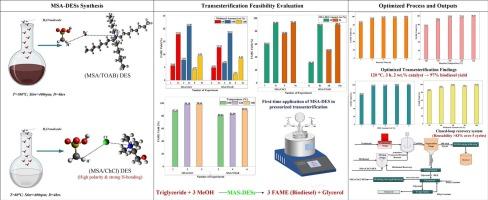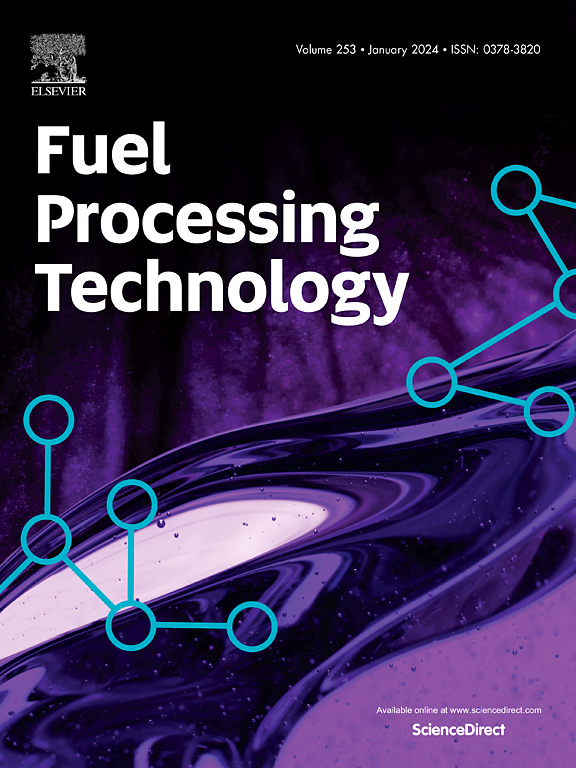通过酯交换反应高效生产生物柴油的可回收甲烷磺酸基深度共晶溶剂
IF 7.7
2区 工程技术
Q1 CHEMISTRY, APPLIED
引用次数: 0
摘要
本研究首次探索了先前开发的两种甲基磺酸基深度共晶溶剂(MSA-based DESs),即MSA/氯化胆碱(MSA/ChCl)和MSA/四辛基溴化铵(MSA/TOAB)在甘油三酯基油酯交换制备生物柴油中的催化应用。其目的是利用msa基DESs的热稳定性和回收潜力,开发可回收的酸催化剂和生物柴油生产的综合加工策略。虽然这些DESs在酯化反应中表现出了效率,但它们在酯交换反应中的表现仍未得到检验。在常压和加压条件下对两种DESs进行了评估,以评估催化活性、甲醇保留率和工艺效率。通过气相色谱法对脂肪酸甲酯(FAME)产率进行了定量,结果表明,在温和的条件下,甲醇保留系统可以实现缓慢但持续的转化,MSA/ChCl在30天后的产率达到45.34%。过渡到加压反应器显著提高了反应动力学,在优化条件下(120°C, 2 wt%催化剂,60 wt%甲醇),MSA/ChCl在3小时内的FAME产率达到97%。进一步增加DES浓度使产率超过99%。优化了甲醇用量、反应时间、温度和DES浓度等关键参数,验证了催化剂的可重复使用性,收率保持在83%以上。为了提高可扩展性和减少浪费,提出了DES和甲醇回收的闭环工艺。本研究扩展了msa基DESs在酯交换反应中的应用,展示了一种可回收的、高活性的Brønsted酸催化剂,能够在低剂量下实现高生物柴油产量,从而解决了传统酸体系的主要局限性,并支持可持续工业生物柴油工艺的发展。本文章由计算机程序翻译,如有差异,请以英文原文为准。

Recyclable methanesulfonic acid-based deep eutectic solvents for efficient biodiesel production via transesterification
This study explores, for the first time, the catalytic application of two previously developed methanesulfonic acid-based deep eutectic solvents (MSA-based DESs), namely MSA/choline chloride (MSA/ChCl) and MSA/tetraoctylammonium bromide (MSA/TOAB), for the transesterification of triglyceride-based oils into biodiesel. The aim was to develop recyclable acid catalysts and integrated processing strategies for biodiesel production, leveraging the thermal stability and recovery potential of MSA-based DESs. While these DESs have exhibited efficiency in esterification, their performance in transesterification remains unexamined. Both DESs were assessed under atmospheric and pressurized conditions to evaluate catalytic activity, methanol retention, and process efficiency. Fatty acid methyl ester (FAME) yields were quantified by gas chromatography, revealing that under mild conditions, the methanol retention system enabled slow but sustained conversion, with MSA/ChCl reaching 45.34 % yield after 30 d. Transitioning to a pressurized reactor significantly enhanced reaction kinetics, with MSA/ChCl reaching a FAME yield of 97 % within 3 h under optimized conditions (120 °C, 2 wt% catalyst, 60 wt% methanol). Further increases in DES concentration enabled yields exceeding 99 %. Key parameters, including methanol dosage, reaction time, temperature, and DES concentration, were optimized, and catalyst reusability was validated over five cycles, with yields remaining above 83 %. A closed-loop process was proposed for DES and methanol recovery to enhance scalability and minimize waste. This work extends the application of MSA-based DESs to transesterification, demonstrating a recyclable, high-activity Brønsted acid catalyst capable of achieving high biodiesel yields at low dosage, thereby addressing key limitations of conventional acid systems and supporting the development of sustainable industrial biodiesel processes.
求助全文
通过发布文献求助,成功后即可免费获取论文全文。
去求助
来源期刊

Fuel Processing Technology
工程技术-工程:化工
CiteScore
13.20
自引率
9.30%
发文量
398
审稿时长
26 days
期刊介绍:
Fuel Processing Technology (FPT) deals with the scientific and technological aspects of converting fossil and renewable resources to clean fuels, value-added chemicals, fuel-related advanced carbon materials and by-products. In addition to the traditional non-nuclear fossil fuels, biomass and wastes, papers on the integration of renewables such as solar and wind energy and energy storage into the fuel processing processes, as well as papers on the production and conversion of non-carbon-containing fuels such as hydrogen and ammonia, are also welcome. While chemical conversion is emphasized, papers on advanced physical conversion processes are also considered for publication in FPT. Papers on the fundamental aspects of fuel structure and properties will also be considered.
 求助内容:
求助内容: 应助结果提醒方式:
应助结果提醒方式:


